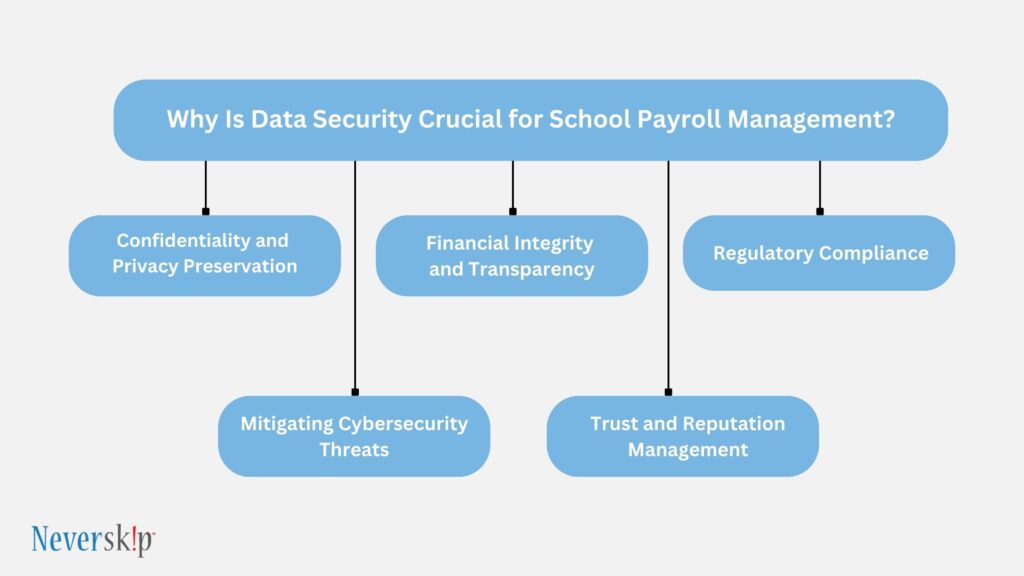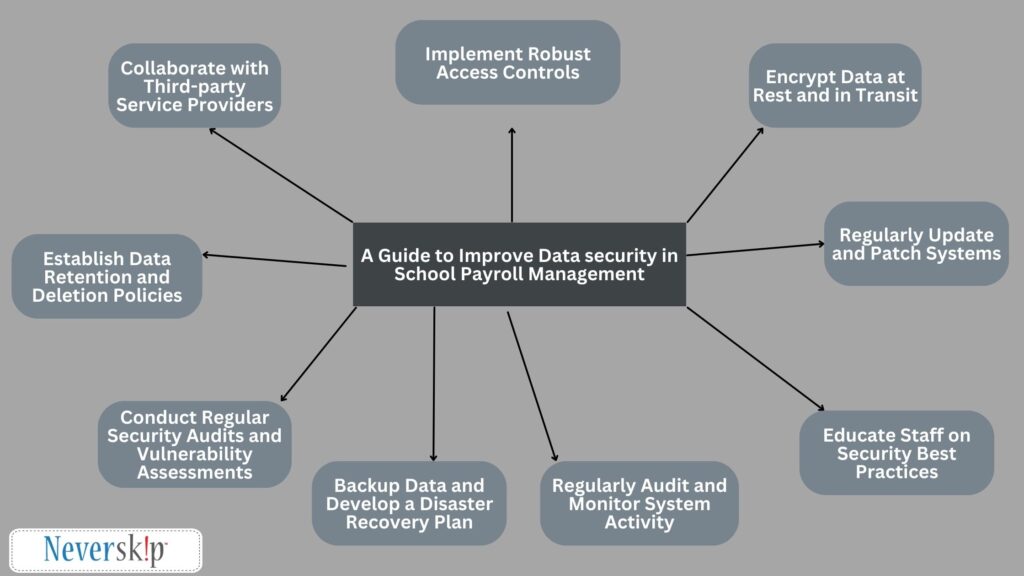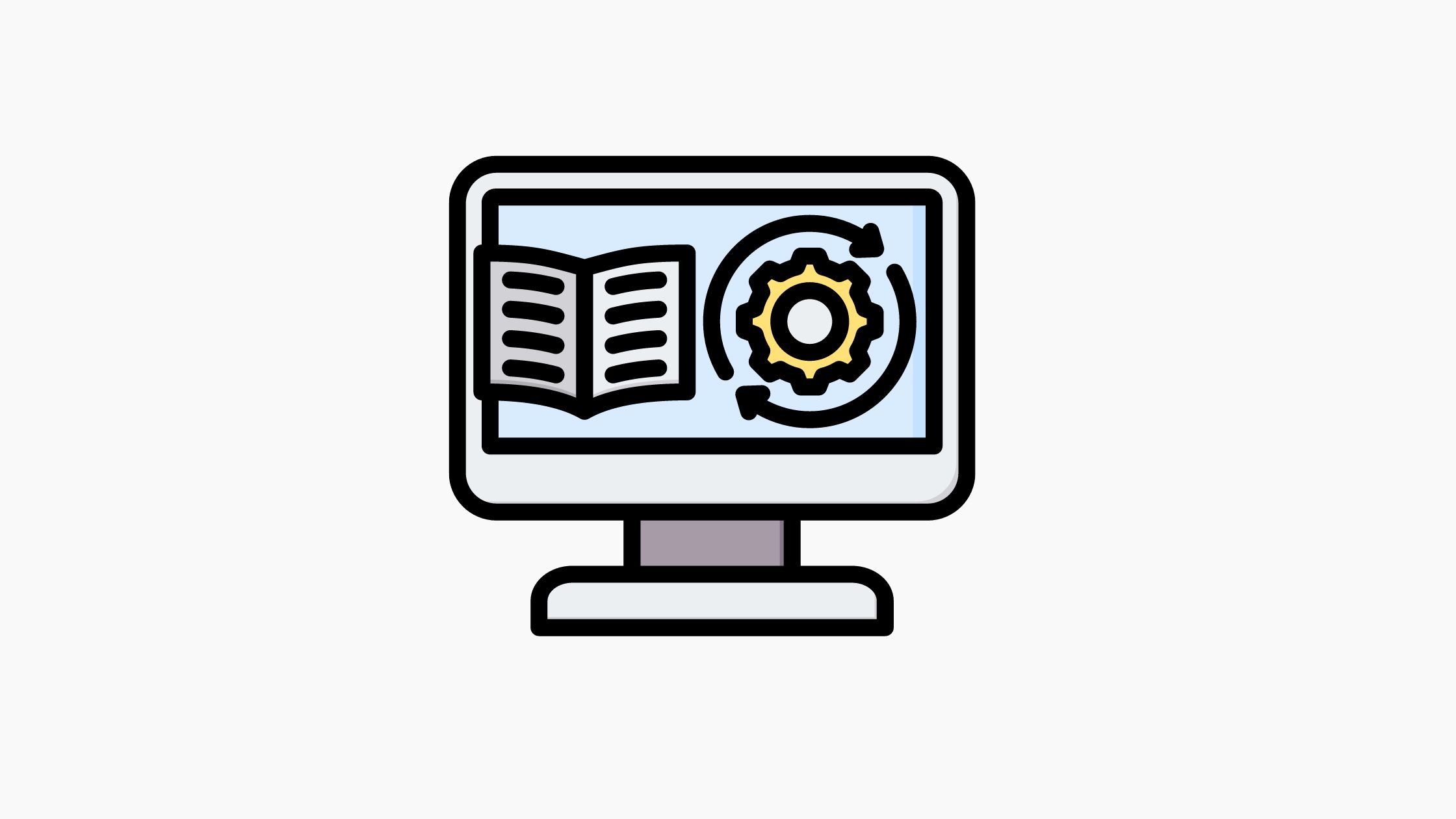Did you know, there were over 146 million data breaches recorded in July, 2023 itself and the education sector is the second most breached sector among them?
Yes you heard it right! And the school payroll management process is one of the leading sources from where sensitive data can be leaked if proper security measures are not taken.
In an era driven by digital advancement, data security has emerged as a paramount concern, encompassing every facet of our lives, including the seemingly mundane processes like payroll management.
Schools, often regarded as centers of learning, innovation, and progress, are not immune to the escalating data security threats that loom over our interconnected world. As technology becomes increasingly integrated into administrative operations, the safeguarding of sensitive payroll data demands urgent attention.
While educational institutions are tasked with nurturing young minds, they must also navigate the intricate landscape of data protection. The treasure trove of information stored in school databases, encompassing employee details, financial records, and personal data, presents an enticing target for cybercriminals seeking unauthorized access.
The consequences of a data breach extend beyond financial losses, potentially eroding trust within the school community and compromising individuals’ privacy.
In this pursuit, schools must be proactive, implementing robust strategies to fortify their payroll management systems against ever-evolving threats. As we delve into the strategies to ensure data security in the realm of payroll management for schools, the imperative to strike a balance between technological innovation and safeguarding sensitive information becomes evident.
So, let’s get started!
Why Is Data Security Crucial for School Payroll Management?

While data security is often associated with safeguarding and managing student information, the significance of ensuring robust security measures for school payroll management cannot be overstated. Here are the top compelling reasons why data security is crucial for school payroll management:
1. Confidentiality and Privacy Preservation
Schools manage a vast array of payroll-related data, including employee names, addresses, Social Security numbers, tax information, and banking details. Mishandling or unauthorized access to this information can lead to identity theft, financial fraud, and privacy violations.
Employees trust schools to maintain the confidentiality of their personal and financial data. Any breach of this trust can not only harm the affected employees but also tarnish the institution’s reputation. Robust data security measures are necessary to uphold the confidentiality and privacy expectations of employees.
2. Financial Integrity and Transparency
Transparent financial practices are essential for maintaining the trust of both employees and stakeholders within the school community. Data breaches or tampering with payroll records can lead to discrepancies in salary calculations, incorrect tax deductions, and unauthorized modifications of financial information.
Such errors can have serious legal and financial ramifications for both the school and its employees. By ensuring data security, schools demonstrate their commitment to maintaining accurate payroll records and fostering financial integrity.
3. Regulatory Compliance
Educational institutions are subject to various data protection regulations, such as –
- Personal Data Protection Bill (PDPB): This is a comprehensive data protection legislation that is currently under consideration by the Indian government. Once enacted, it will establish a framework for the protection of personal data, including data collected and processed by educational institutions. The bill outlines principles for data processing, consent mechanisms, data localization requirements, and penalties for non-compliance.
- Information Technology (Reasonable Security Practices and Procedures and Sensitive Personal Data or Information) Rules, 2011: These rules, under the Information Technology Act, lay down guidelines for the collection and handling of sensitive personal data. Educational institutions are required to follow certain security practices and procedures to protect sensitive personal information from unauthorized access or disclosure.
- Right to Education (RTE) Act, 2009: While not exclusively a data protection regulation, the RTE Act emphasizes the importance of protecting the privacy and rights of children. It requires schools to maintain records of children’s personal information and ensure that such data is not misused.
- Education Boards’ Data Protection Regulations: Various education boards in India, such as CBSE (Central Board of Secondary Education) and state education boards, often have guidelines and regulations regarding the management of student data, examination records, and other sensitive information.
These regulations mandate the secure handling and storage of sensitive student and employee data. Non-compliance with these regulations can result in severe penalties and legal actions. Since payroll data contains personal information, schools must ensure they adhere to relevant data protection laws.
By implementing robust data security measures, schools can demonstrate their dedication to compliance and avoid legal pitfalls.
4. Mitigating Cybersecurity Threats
The digital landscape is rife with cybersecurity threats, including phishing attacks, malware infections, and ransomware incidents. Educational institutions are not exempt from these threats; in fact, they can be lucrative targets due to the valuable information they hold.
Cyberattacks can compromise payroll systems, disrupt financial operations, and cause significant financial losses. By investing in cybersecurity protocols, such as firewalls, encryption, and regular system updates, schools can fortify their defenses against cyber threats and ensure the continuity of their payroll operations.
5. Trust and Reputation Management
Trust is the foundation of any educational institution’s relationship with its employees, students, and their families. A data breach or security incident can erode this trust, leading to a loss of confidence in the school’s ability to protect sensitive information.
News of a data breach can spread quickly and tarnish the school’s reputation within the community. Rebuilding trust after such an incident is challenging and time-consuming. By prioritizing data security, schools can proactively safeguard their reputation and maintain the trust of all stakeholders.
Also Read: Efficient Staff Management In Education: The Role Of HR And Payroll Systems
A Guide to Improve Data security in School Payroll Management

Safeguarding sensitive information within the payroll management system is not just a technical necessity; it’s a critical aspect of preserving the confidentiality, integrity, and trustworthiness of the institution as discussed above.
Now, let’s walk you through the key strategies to enhance data security within school payroll management systems, ensuring a robust shield against potential threats.
1. Implement Robust Access Controls
Access control is the cornerstone of data security within any organization’s infrastructure, including payroll management systems. Restricting access to authorized personnel helps minimize the risk of unauthorized data tampering or breaches. Institute a principle of least privilege, granting employees access only to the information necessary for their roles.
Regularly review and update access permissions based on job responsibilities and staff turnover. Additionally, consider implementing multi-factor authentication (MFA) to add an extra layer of protection, requiring users to provide multiple forms of verification before accessing the payroll management system.
2. Encrypt Data at Rest and in Transit
Encryption plays a pivotal role in safeguarding sensitive data and school resources within the payroll management system. Implement encryption protocols to secure data both at rest, when stored on servers or databases, and in transit, when being transmitted between devices.
This ensures that even if unauthorized access occurs, the data remains incomprehensible and unusable. Use industry-standard encryption algorithms and regularly update encryption keys to maintain the effectiveness of this security measure.
3. Regularly Update and Patch Systems
Payroll management systems, like any other software, are susceptible to vulnerabilities that can be exploited by malicious actors. Regularly update and patch the system’s software, operating systems, and applications to address known security flaws.
Delayed updates can create vulnerabilities that cybercriminals can exploit to gain unauthorized access. Establish a systematic process for applying patches promptly and consistently, while also ensuring that the updates are compatible with other integrated systems.
4. Educate Staff on Security Best Practices
Human error remains one of the leading causes of data breaches. Educating staff about security best practices is essential to creating a culture of vigilance and responsibility.
Conduct regular training sessions to raise awareness about phishing scams, social engineering tactics, and proper password management. Encourage employees to report suspicious activities promptly and provide resources for them to stay informed about emerging cybersecurity threats.
5. Regularly Audit and Monitor System Activity
Continuous monitoring and auditing of the payroll management system’s activities can help detect unusual behavior or unauthorized access promptly. Implement intrusion detection and prevention systems (IDPS) to identify potential security breaches in real-time.
Regularly review system logs to track user activity, detect anomalies, and address potential threats proactively. These monitoring practices provide valuable insights into the system’s health and security status, enabling swift action in case of any abnormalities.
See More: Enhancing Campus Safety: The Role Of Attendance Management Systems In Emergency Situations
6. Backup Data and Develop a Disaster Recovery Plan
No system is entirely immune to unforeseen incidents, such as hardware failures, natural disasters, or cyberattacks. Creating regular backups of payroll data is crucial to ensure its recovery in the event of data loss. Store backups in secure, off-site locations or on cloud platforms with robust security measures.
Moreover, develop a comprehensive disaster recovery plan outlining the steps to be taken in case of a security breach or data loss. Regularly test the recovery process to ensure its effectiveness and adapt the plan based on evolving threats and technology.
7. Conduct Regular Security Audits and Vulnerability Assessments
Regular security audits and vulnerability assessments are essential for identifying weaknesses in the payroll management system’s security infrastructure. Engage security experts or use automated tools to scan the system for vulnerabilities that could potentially be exploited by malicious actors.
Address any identified vulnerabilities promptly and implement security patches and updates to mitigate risks. By conducting these assessments regularly, schools can stay ahead of potential threats and enhance their system’s overall security posture.
8. Establish Data Retention and Deletion Policies
In the realm of data security, retention and deletion policies are often overlooked but are vital components. Define clear guidelines for how long payroll data should be retained and when it should be securely deleted. Outdated or unnecessary data poses a potential security risk if it falls into the wrong hands.
By adhering to well-defined data retention and deletion policies, schools can minimize the potential impact of a data breach and maintain a leaner, more manageable data ecosystem.
9. Collaborate with Third-party Service Providers
Many schools rely on third-party service providers for various aspects of their operations, including payroll management systems. When outsourcing payroll services, it’s crucial to assess the security measures of these providers.
Ensure they adhere to the same high standards of data security that your institution upholds. Review contracts and service level agreements to clearly outline data security responsibilities and expectations. Regularly communicate and collaborate with third-party providers to stay informed about security updates, audits, and any potential risks.
Also read: Real-Time Tracking: The Advantages Of Cloud-Based Attendance Management Systems
The Bottom Line
Ensuring robust data security in school payroll management systems is not just a choice but a necessity in today’s digital landscape. The sensitive nature of payroll data, coupled with the increasing prevalence of cyber threats, mandates a proactive approach towards safeguarding this critical information.
By implementing the strategies outlined in this guide, educational institutions can protect employee confidentiality, maintain financial accuracy, adhere to regulations, and preserve trust within their community.
Neverskip’s school payroll management system stands as a prime example of how technological innovation can be harnessed to address these challenges effectively.
With a holistic approach to data security, Neverskip not only safeguards sensitive information but offers a comprehensive suite of competitive solutions. From seamless staff attendance management to automated payroll processing and easy overtime management, Neverskip’s system streamlines administrative processes while ensuring data integrity.
Furthermore, its full compliance with labor laws underscores its commitment to legality and ethical practice. In a realm where data breaches can have far-reaching consequences, Neverskip’s integrated approach not only enhances efficiency but also provides the peace of mind that comes with knowing that sensitive payroll data remains secure.
Intrigued to try it out?
Book a free demo today!








